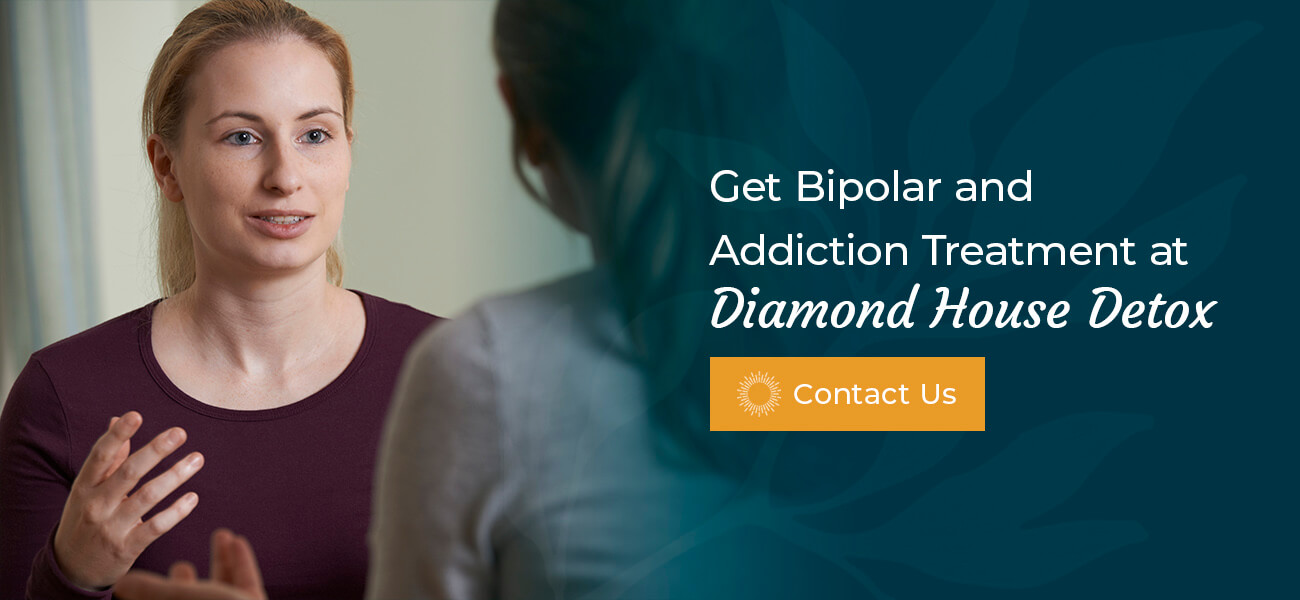Bipolar disorder is a mental health condition affecting approximately 2.5% of adults in the U.S. Bipolar disorder symptoms are characterized by fluctuations between high and low moods. It’s not uncommon for people with bipolar disorder to also have substance use disorder. This type of dual diagnosis can become a vicious cycle where individuals take substances to mask or manage their symptoms.
While living with bipolar disorder can impact daily functioning — especially for those also facing substance use disorder — there are ways to manage symptoms and lead a happier, healthier life. At bipolar treatment centers, mental health professionals and addiction specialists can help you with this dual diagnosis. Learn more about bipolar disorder and how professionals can help you feel better and regain control of your life.
Bipolar disorder is a mood disorder that affects energy and mood levels. The condition causes mood swings with emotional highs — mania or hypomania — and lows — depression. In times of depression, you might feel low energy, sad and hopeless and lose interest in being around friends or partaking in hobbies. When your mood changes to mania or hypomania, you might feel blissful, irritable or energetic.
Some individuals with bipolar disorder also experience mixed episodes, which include symptoms of both depression and mania or hypomania.
Shifting moods can impact your sleep, energy and behavior. You might also have cloudy judgments or thoughts. Extreme symptoms might rarely occur or several times in one year, and some might also experience emotional challenges between these symptoms.
There are multiple types of bipolar disorder, from Bipolar I and Bipolar II to Cyclothymia and others. Each type also comes with subsets or qualities that can lead to a formal diagnosis. Differences between two common types are as follows:
Bipolar disorder affects men and women equally and tends to run in families. Some might experience symptoms earlier in life and not be diagnosed with the condition for several years. Many people with bipolar disorder also struggle with substance use disorder, making it essential to treat both conditions simultaneously for treatment to be effective.
While the condition is lifelong, a treatment plan can help you manage symptoms and moods with more ease. For instance, medications and psychotherapy might help you work through depressive or manic episodes so you can live a more comfortable life.
Bipolar disorder treatment can help you manage symptoms affecting your daily functioning. Also, a dual diagnosis can help you break the addiction cycle and regain control of your life.
Episodes can occur anytime, but stressors like lack of sleep, relationship problems, financial stress and trauma can trigger some individuals’ symptoms. Additionally, co-occurring disorders like addiction and depression can intensify bipolar symptoms like anxiety and depression.
Outpatient programs for bipolar disorder often take a holistic approach to help you address symptoms of the condition and manage a dual diagnosis. These plans are tailored to each client based on their history and unique needs, treating symptoms of addiction and bipolar disorder equally.
Bipolar residential treatment can help you manage symptoms in a safe, controlled environment when your safety might be at risk. At the same time, you might enter inpatient programs simply for the feeling of stability and security. Outpatient programs for bipolar disorder can include ongoing therapy sessions and medication management while living at home.
While receiving a bipolar diagnosis may feel overwhelming at first, know that you are not alone and help is available. Bipolar treatment centers like Diamond House will provide holistic care to help you on your mental health journey one step at a time.
When compounding bipolar symptoms with addiction, individuals are more prone to long-term health consequences and risky behaviors, making it essential to treat both conditions as soon as possible.
The best residential treatment centers for bipolar disorders recognize how the conditions relate and can worsen each other. By providing you with a dual diagnosis, the professional at Diamond House can help you recover from addiction and manage symptoms of bipolar disorder. We offer the following programs:
Bipolar residential treatment centers can provide much-needed stability to people struggling with addiction and bipolar disorder. Our ultimate goal at Diamond House is to help you achieve a better sense of well-being by helping you manage symptoms, work toward addiction recovery and have a healthy, fulfilling life.
We’ll partner with you to develop a treatment plan that addresses the challenges underlying your addiction or bipolar disorder and implement a blend of evidence-based and holistic therapies to suit your specific needs.
Having a loved one struggling with bipolar disorder might leave you wondering about the best way to support them. The highs and lows they experience can feel overwhelming, though there are plenty of steps you can take to assist your loved one:

Bipolar disorder is a severe mental illness that causes people to experience extreme mood swings. This can make it very difficult to function at work, school or home. People with bipolar disorder are also at risk of substance use disorder.
If you or a loved one has bipolar disorder and substance use disorder, don’t hesitate to reach out to Diamond House. Contact us today to learn more about how we can help with bipolar disorder treatment near Sacramento.